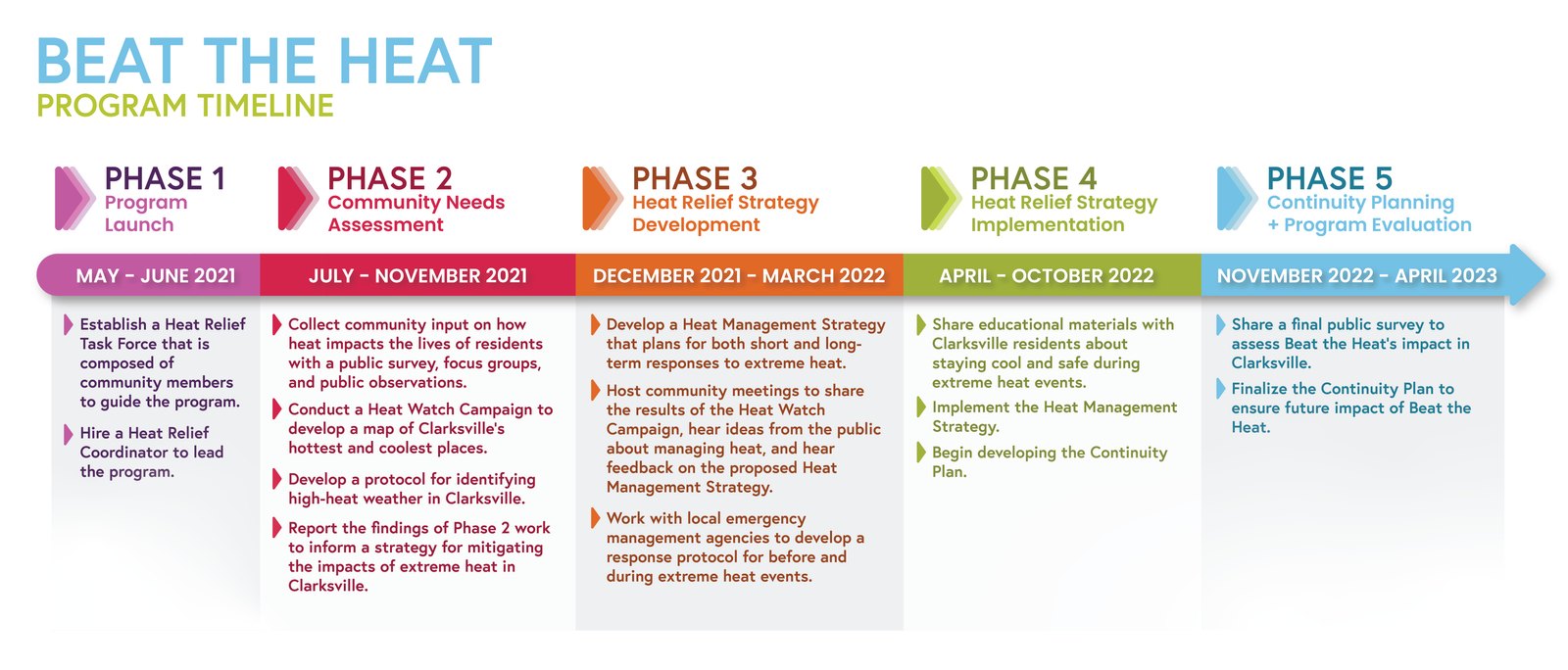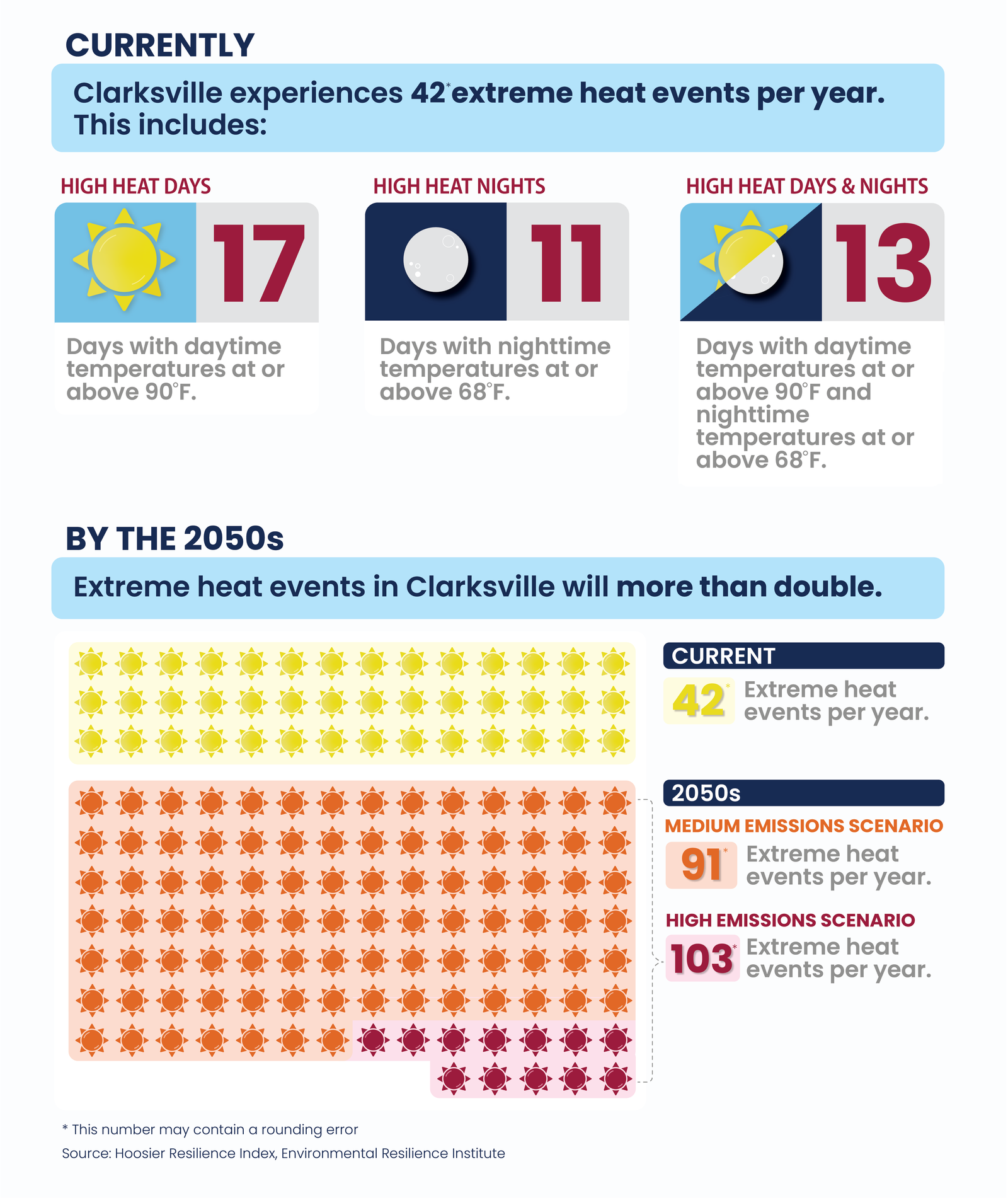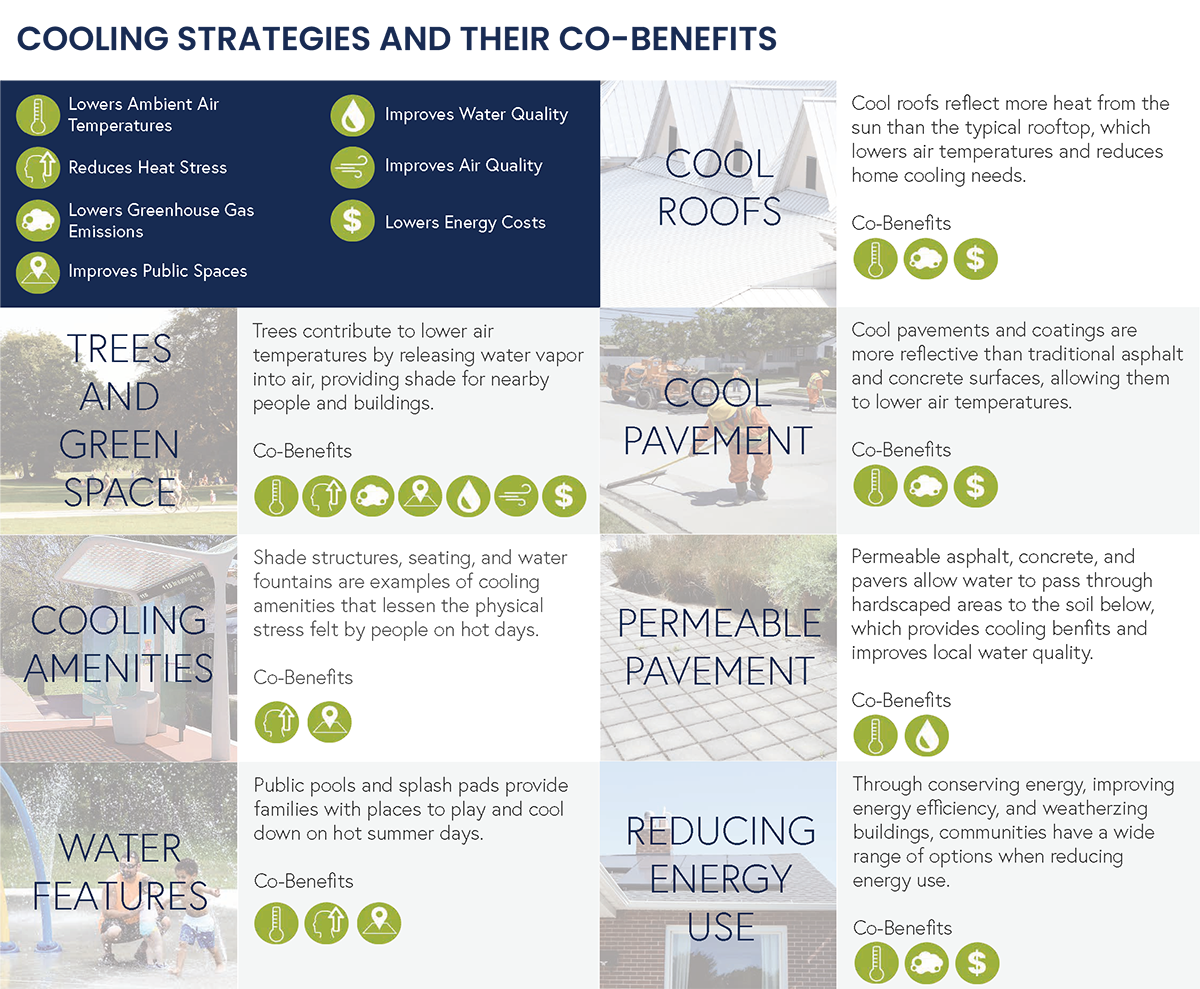Beat the Heat
Welcome to Beat the Heat
Beat the Heat
Beat the Heat is a new initiative from Indiana University’s Environmental Resilience Institute and supported by the Indiana Office of Community and Rural Affairs that is designed to help communities deal with the impacts of extreme summer heat. In the Spring of 2021, the Town of Clarksville was awarded a grant for Beat the Heat, giving the Town the opportunity to both study the impacts of extreme heat in Clarksville and develop local strategies to alleviate the impacts of heat on the community. Beat the Heat is a 2-year program and will run from the summer of 2021 to the summer or 2023.
Heat Management Plan
In June 2022, Clarksville adopted its first Heat Management Plan. This plan outlines 26 strategies that will lower air temperatures in Clarksville and help the community be better prepared for summer heat. This plan will guide Beat the Heat in its second and final year. Upon the completion of Beat the Heat in the spring of 2023, the plan will be updated with a continuity plan that will guide long-term heat relief efforts in Clarksville.
Get Prepared for Summer Heat
Sign Up for Heat Alerts
Get notified when things are heating up in Clarksville so you can be prepared when a heat wave is forecasted. You can sign up for text, voice call, and/or email alerts. With text and email alerts, you will also receive updated information on local cooling resources and ways to stay cool. To sign up, create an account with Clark County Emergency Management’s Smart 911 system or login to update your existing account. A Spanish language option is also available.
Join the Heat Wave Check-In Pilot Program
Some people in the community are more vulnerable to extreme heat, such as older adults, pregnant people, young children, people with long-term illnesses and disabilities, outdoor workers, homeless individuals, and people without access to quality air-conditioning.
If you have friends, family, or neighbors that fall into these categories and you would like reminders to check on them when it is hot outside, then sign up for the Heat Wave Check-In Program. By participating, you will receive text messages or emails on hot days that will provide you with questions to ask heat-vulnerable people, information on heat-related illnesses, and best practices for helping your friends and family stay safe when it is hot outside. You’ll also receive brief questions after each heat wave so Beat the Heat staff can learn about the best ways to help support you.
This is a pilot program, so only 20 participants will be accepted for Summer 2022. You can sign up at any point in the summer. To register, fill out this Form or call (812) 283-1437.
Visit a Cooling Center
If you need a place to cool down on a hot day, take a beat at a local cooling center. In Clarksville, here are some places you can check out:
Clarksville Library
1312 Eastern Boulevard
Mon-Thu: 9am to 8pm
Fri-Sat: 9am to 5pm
Sun: Closed
Visitors should engage with a library activity, such as reading a book, using the computer, or attending an event.
Salvation Army
528 Little League Boulevard
Open 11am to 4pm whenever temperatures reach 90° or higher.
Attend a Heat-Preparedness Workshop
This summer, Beat the Heat is coordinating with local health agencies to provide community workshops on heat-preparedness. By attending one, you can learn about the symptoms of heat-related illnesses, how to treat them, how to stay safe during the summer, and how to access local heat-preparedness resources. Below is an updated list of trainings this summer:
Healthy in the Heat at the Clarksville Library (1312 Eastern Boulevard)
Workshop hosted with Clark Memorial Hospital
Tuesday, July 19th at 2pm.
Extreme Heat in Clarksville
To date, extreme heat is the deadliest weather hazard in the US, responsible for more deaths each year than hurricanes, tornadoes, and flooding. The CDC reports that an average of 65,000 Americans are admitted into emergency rooms in the U.S. due to heat-related illness every year. On hot days and nights, people are at risk for heat-related illnesses, such as heat exhaustion and heat stroke.
While heat waves have always posed a public health risk, they are becoming more common and more intense. There are two reasons for this trend: the heat island effect and climate change.
Clarksville’s Heat Island
In August of 2021 a group of 17 volunteers participated in Clarksville’s Heat Watch Campaign by recording air temperatures across town on a hot summer day. Their efforts resulted in a map that identifies the hottest and coolest areas of Clarksville. The map found that, on a hot day, areas of town with fewer trees and more pavement are up to 7° hotter than heavily wooded areas. Even some residential neighborhoods are hotter than others. Explore the results of this heat map and learn more about the heat island effect by using the online, interactive story map at: www.tinyurl.com/ClarksvilleHeatStory.
Climate Change
In recent years, Clarksville has experienced an average of 42 extreme heat events per year. By the 2050s, this number is projected to more than double, with Clarksville experiencing between 91 and 103 extreme heat events per year.
Strategies like tree planting, improving household energy efficiency, and investing in infrastructure that contributes to lower air temperatures can help combat both climate change and the heat island effect while providing other benefits to the community. Check out the Heat Management Plan at the top of the page to learn more about what can be done in Clarksville.
Learn More about Heat Preparedness
To learn more about how you can beat the heat, check out some of the resources below:
Get Beat the Heat updates!
Are you interested in keeping up with Beat the Heat? Sign up for the newsletter to receive updates about our work, public meetings, and ways to get involved!
PRESS
- News and Tribune: Clarksville heat relief plan gets green light
- News and Tribune: Experts offer tips to beat heat as temperatures hit
- News and Tribune: Clarksville program aims to lower heat, keep residents safe
- WFPL: Track the hottest spots in Clarksville with the new interactive heat maps
- News and Tribune: Clarksville students join effort to mitigate extreme heat in the town
- WDRB: Town of Clarksville looking at ways to beat the heat
- WHAS 11: Clarksville launches new initiative to combat extreme heat
- WLKY: Beat the Heat initiative in Clarksville aims to save lives, gather community input
- Environmental Resilience Institute: IU partners with Indiana cities to address risks posed by summer heat
- News and Tribune: Clarksville launches new initiative to combat extreme heat



